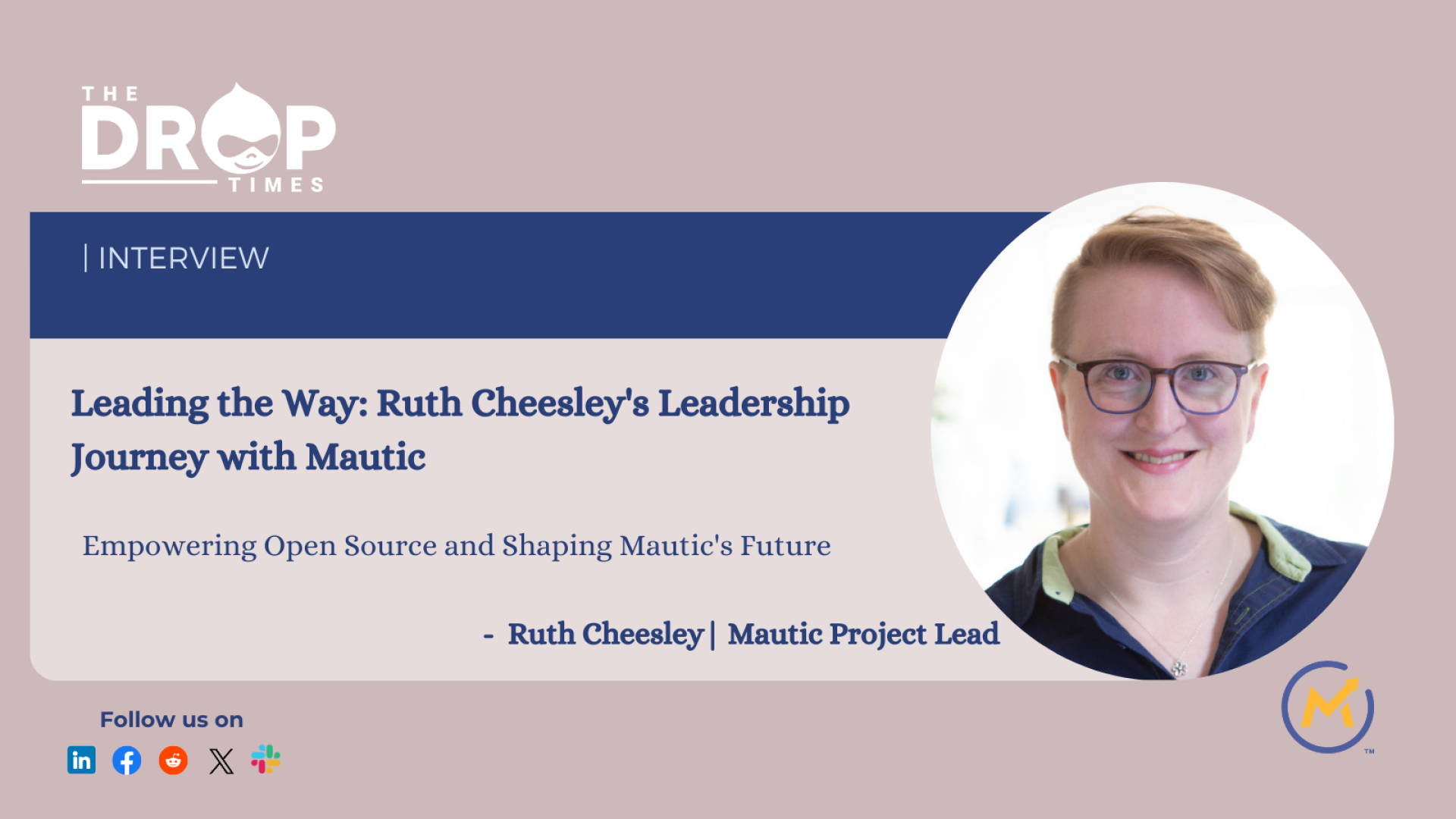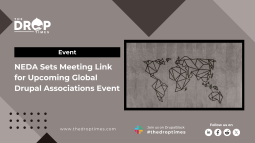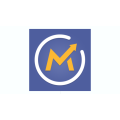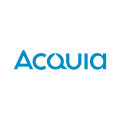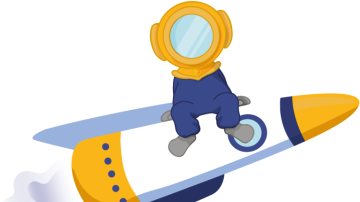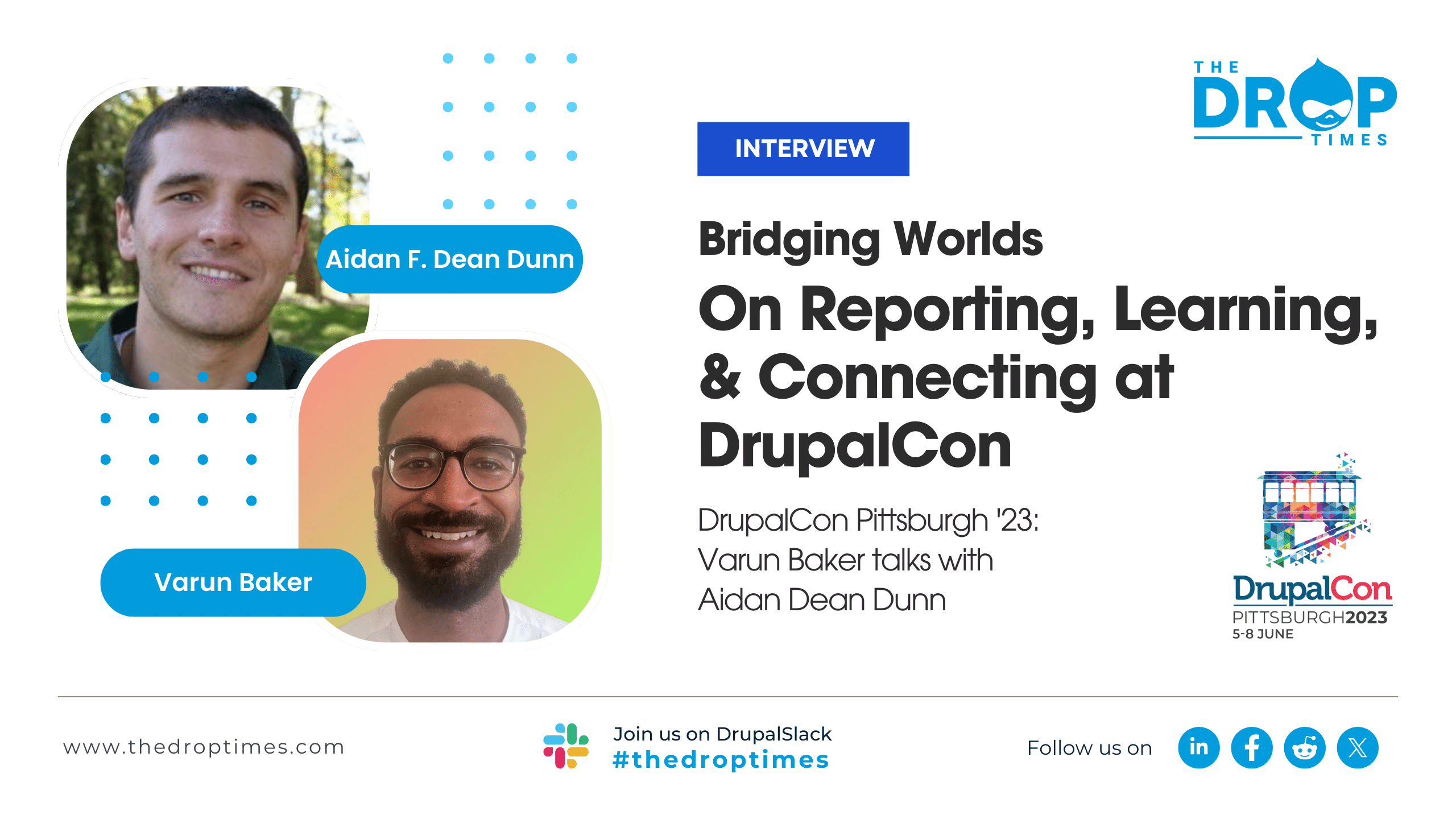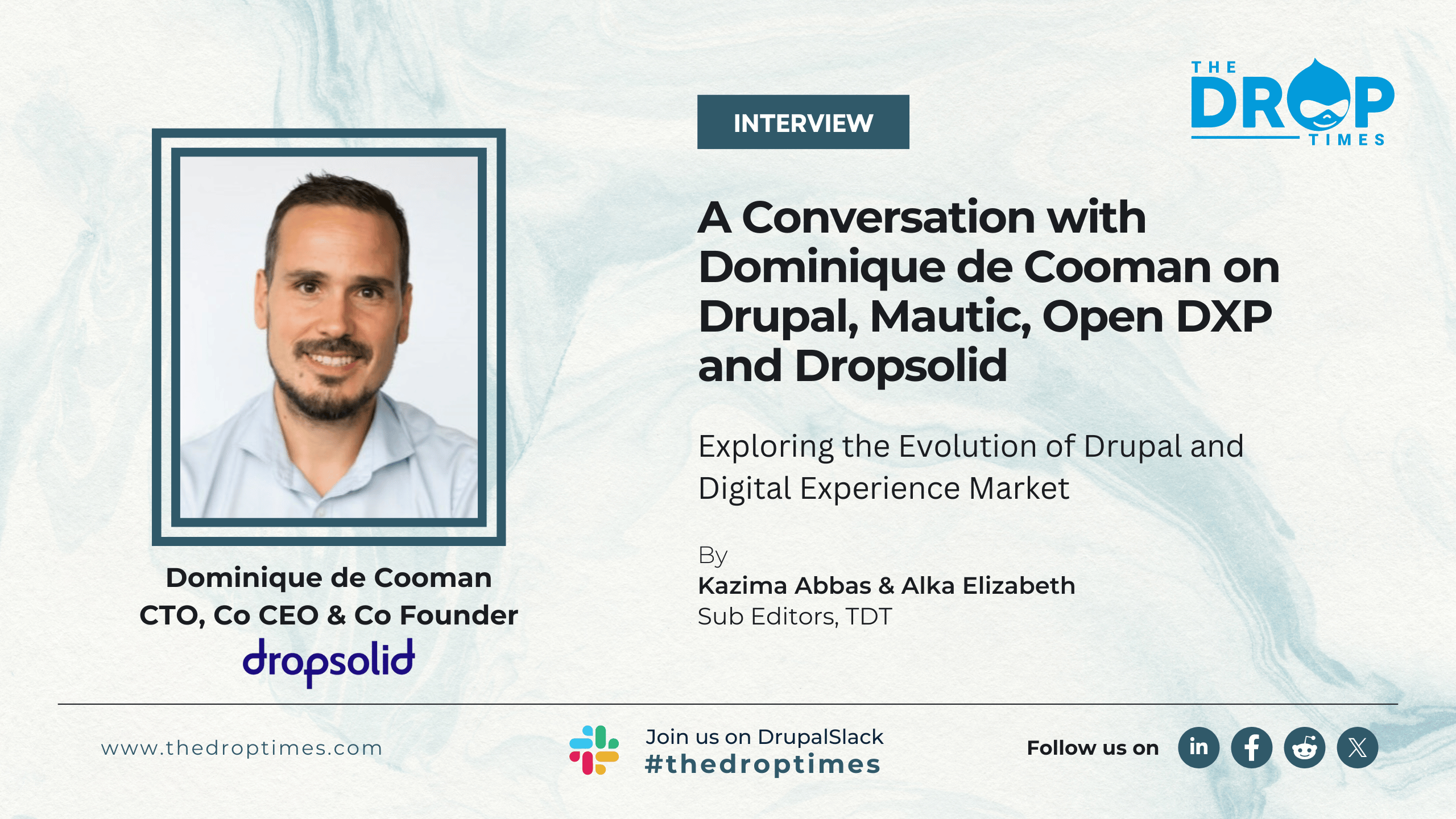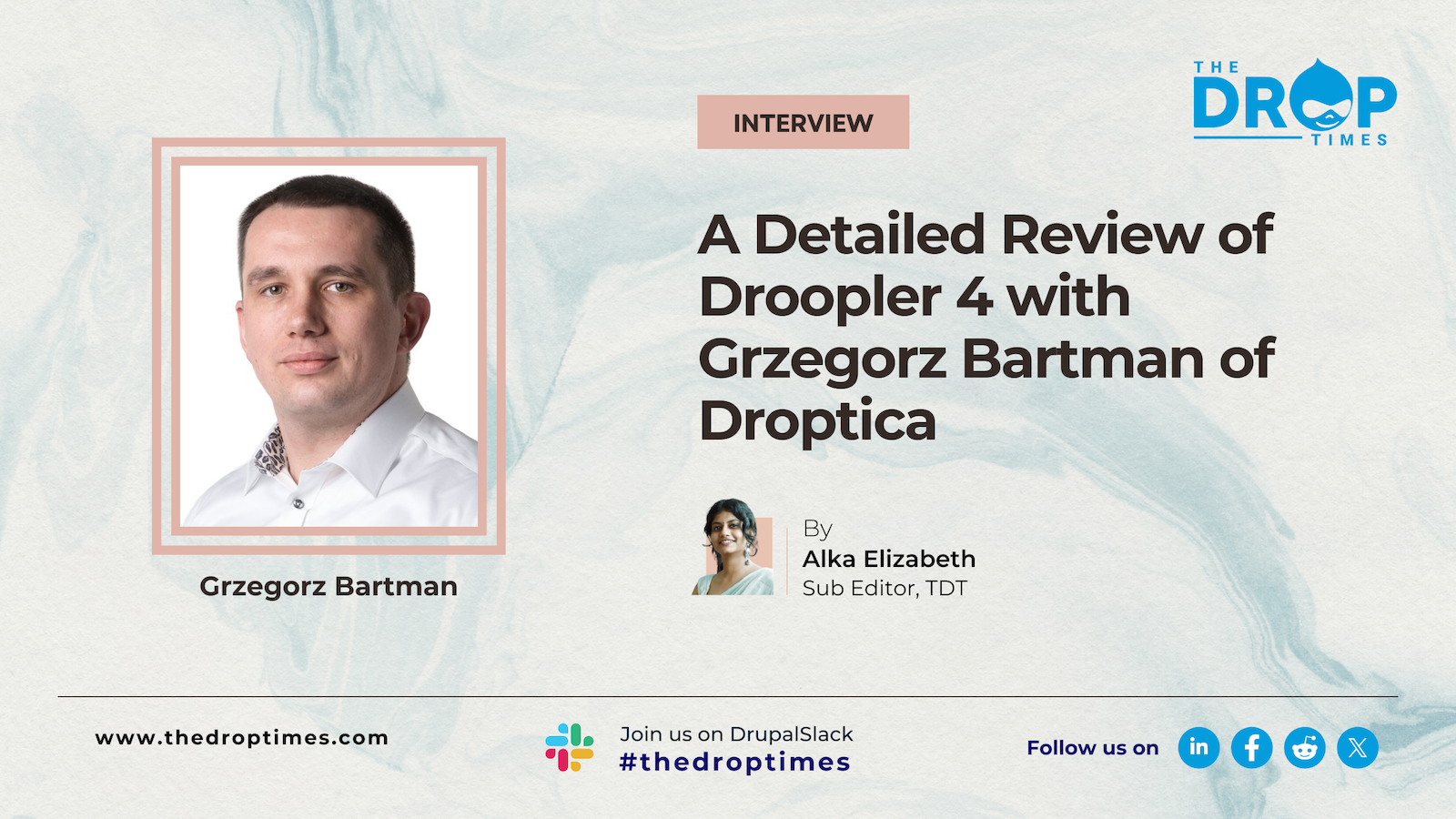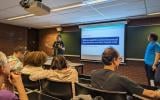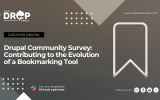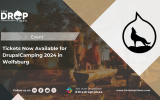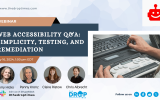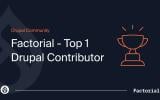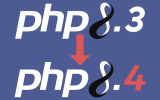Leading the Way: Ruth Cheesley's Journey with Mautic
As MautiCon prepares to debut in India, The DropTimes (TDT) is honoured to present an exclusive conversation with Ruth Cheesley, the Mautic Project Lead and a featured keynote speaker at the conference beginning tomorrow. Ruth Cheesley's journey through the realms of open-source mirrors a remarkable trajectory, evolving from a user to an invaluable contributor and eventually rising to a pivotal leadership position within the Mautic community.
Her journey with open-source began during her student years, utilizing free resources as computational tools. The innate drive for community building and her knack for identifying and filling gaps in open-source projects catalyzed her movement toward Mautic. Ruth's contributions have been pivotal in shaping Mautic's trajectory, underscored by her ongoing role as its project leader after Acquia's acquisition and the independence transition.
Reflecting on her experiences, Ruth offers a piece of advice that encapsulates her ethos:
"The hardest thing to do is to raise your hand and say 'I’d like to help,' so jump over that hurdle and see where it takes you!"
Ruth Cheesley, the Mautic Project Lead, talks with Elma John, a sub-editor with TDT, prior to the Mauticon India Conference 2024.
Please read on.
TDT [1]: Ruth, you have a long-standing relationship with open-source. Even before becoming a contributor, you were a benefactor of it. At what point in your career did you decide to step up to be an open-source contributor? Additionally, we would love to hear how your path led you to Mautic. What were the initial steps and motivations that drew you to this particular project?
Ruth Cheesley: I came across open-source for the first time when I was a broke student (studying Sports Science!) and needed software for my laptop. I started using some open-source antivirus software and soon ended up helping others find open-source tools instead of the expensive proprietary software none of us could afford. Then, I got into clearing viruses and doing data recovery using tools like Knoppix to earn a bit of cash. I was definitely a consumer; all I knew then was that it was free!
I joined the Computing Society and Multiplayer Gaming Society and ended up living for several years with three friends who all did Computer Science and were big Linux fans, so it was quite a geeky household, and they taught me a lot!
I first stepped over the contribution threshold after complaining about how difficult it was to register an official user group in Joomla! project because I was using Joomla! to build websites as a side hustle, and I wanted to meet up with others who were also using Joomla! so we could help and learn from each other.
As is often the case, if you complain about something, you’re often invited to be a part of the solution. I went to JoomlaDay UK in Maidstone and had a chance to meet with the community, which was pretty scary as I knew nobody at all, but I learned a lot and met some of the original founders of Joomla!
I started to help with the User Groups team, and then I got some funding from the UK government (I was running a business at this point, building Joomla websites) to speak at the first Joomla World Conference in San Jose. That’s where I stepped into contributing in a bigger way, as I was asked soon after to join the Community Leadership Team and was invited to speak at several other events worldwide.
I came across Mautic when the Founder, DB Hurley, told me about the new project he was working on. We were both on the Leadership Team of Joomla at the time. I was interested because I was already providing marketing services to my Joomla clients, so I was a very early adopter—I think it was in mid-2014 that we started using Mautic and offered it in 2015 to our clients, and around that time, I started to contribute to the community.
It attracted me because I could see the power of such a solution in an open-source context and because it overlapped well with what I already offered customers. More and more, they were expecting me to provide them with the tools to do their marketing, and Mautic allowed me to do this using Open Source tooling.
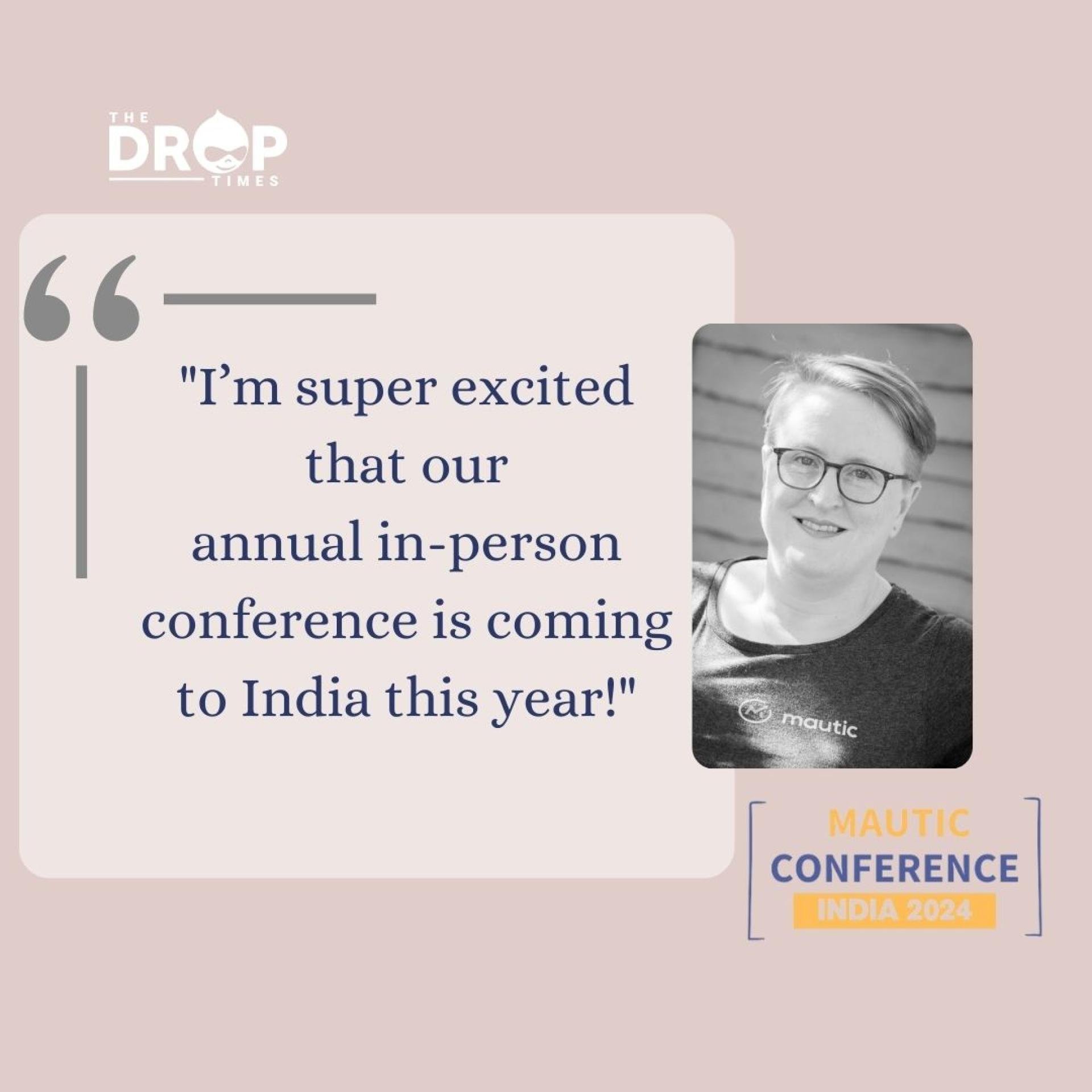
TDT [2]: MautiCon is making its debut in India. Can you share your enthusiasm for being part of this historic occasion? And what went into the decision to host the APAC region’s largest Mautic Conference in India for this year?
Ruth Cheesley: I’m super excited that our annual in-person conference is coming to India this year! When we started to hold in-person events (unfortunately right before the pandemic hit), we decided to rotate continents each year—both to give the local communities the opportunity every few years to attend the official in-person conference without having to travel abroad and also because it allows different communities to step up and run such a prestigious event.
Our first event post-pandemic was in Europe—it was a very small one as people at that point weren’t overly confident with being at in-person events. Then, we moved to Brazil in November 2022, and this year, several people in India emerged who were interested in hosting the event. I have to say, the local team has been outstanding in taking on the project, building a team of volunteers, and getting things up and running.
We know that India has a large interest base in Mautic from our statistics, so I’m looking forward to spreading the word and inspiring Mauticians in India to learn more about Mautic and get more involved in the project.
TDT [3]: As the Mautic Project Lead and the keynote speaker at MautiCon India 2024, what key themes or topics will you address during your session at MautiCon?
Ruth Cheesley: Well, of course, I don’t want to spoil it for people, so I’ll share a few themes with you. I have delivered a keynote at each conference, called 'The Mautic Update'. I share updates from across the Mautic project, celebrate our top contributors, share news about initiatives and progress we’re making as a project and community, and often sneak previews of things on the horizon. This year, naturally, there will be some focus on our progress in becoming an independent open-source project and how we’re doing with that process, and there may even be a top-secret announcement too—you’ll have to come along to find out more!
TDT[4]: You're an advocate for encouraging minorities in the tech industry. How can events like MautiCon foster diversity and inclusion in the open-source community?
Ruth Cheesley: I believe that open-source is a great place for us to establish a culture that is welcoming and inviting to all in a way that sometimes doesn’t exist in the wider world. I don’t pretend to know the experience of all minorities, but as a woman who lives with a disability, I’ve had my fair share of bullying and intimidation both within open-source circles and in the wider world, so I try to ensure that we, as an open source project, work hard to create supportive conditions for everyone to join us and learn more about Mautic and indeed open source.
As a starting point, working to try to put together a diverse lineup that caters to all areas of the open source project, from developer-focused tracks to marketing-related topics and everything in between, ensures that anyone who uses or is involved with Mautic at any level can find sessions that encourage and inspire them.
Also, building a diverse team and lineup of speakers helps ensure that folks see themselves represented by those on the stage and in the team who run the event. This can be quite challenging, especially regarding speakers—my personal experience was that I did not consider submitting sessions for conferences until a friend told me she thought I should speak about a particular topic and helped me write my first session submission. If it weren’t for her, I probably wouldn’t have stepped up and put myself forward (Thanks, Dianne!)
In the future, I’d love to see us working on bringing a more balanced lineup; this year, we’re quite male-heavy when it comes to speakers. My side-project of the Women of Open Source community is also an attempt to help women feel more welcomed and confident in contributing to open source by having a safe space where we can learn, share, and support each other.
Although our Mautic conferences are quite small compared with other, larger events, I feel that our awesome community members have a strong culture of helping each other, looking out for each other, and calling out behaviours that don’t align with our values—we’ve tried to build this into our core ethos actively. As we grow, I hope we will also be able to widen the services we already provide at our conference to ensure we’re catering to more of the needs people may have, such as providing facilities for childcare, extended support for people with disabilities, and so forth.
TDT [5]: Acquia's acquisition of Mautic Inc., the SaaS provider and trademark holder of the Open-Source Mautic project in 2019, caused quite a turbulence within the Mautic community because of the uncertainties and fear of losing autonomy. Going with the trend of OpenOffice developers forking it to Libre Office following the acquisition of Sun Microsystems by Oracle, some even believed now that Mautic might be forked. Fortunately, as Acquia was a reputed open-source company, it did not happen, and the project thrived under their support. Meanwhile, they rebranded the Mautic SaaS products and included them in their DXP offerings. After the assimilation of the SaaS marketing kit, Dries writes that he tried to push Drupal Association to become an umbrella organization under which Mautic will be another project. This move, too, didn’t get enough traction. In mid-April last year, Acquia gave up its ownership over the project's steering and made Mautic an autonomous stand-alone project, handing over the trademarks and domain to the community. They also relinquished their right to appoint the project lead. Notably, you became project lead under Acquia’s supervision and have continued to be so under community leadership. How do you perceive these transitions now that Mautic is a fully community-owned project? Has the M&A and further opening up/independence moulded Mautic for the best? Or do you perceive the major sponsor’s stepping back as a letdown?
Ruth Cheesley: That’s a great question! Indeed, when the acquisition was announced, there was a lot of fear and uncertainty in the Community. At that time, the open source project was quite embryonic—there wasn’t much in the way of governance, but we did have many passionate people who wanted to ensure that Mautic would continue to be open source. At that point, I was a user of Mautic, so I was involved in some of those early discussions about what to do and how to move forward before I was given the opportunity to work for Acquia as a Community Manager for Mautic.
Acquia’s involvement helped Mautic establish itself on much firmer foundations than it would have been without their support. It enabled us to have someone working full time for the project for several critical years where the project started to ‘grow up’. In those years, we’ve made immense progress as an open-source project, community, and product.
When Acquia announced they could no longer support Mautic’s growth as we advanced, we had some big decisions to make. I’m going to be speaking about that in more detail at FOSDEM and FOSS Backstage, about how we came to decide which way to go—whether to join a foundation or association, start our own non-profit, or continue as we were using the Open Source Collective as our fiscal host.
Ultimately, I believe that we (the Leadership team of the Mautic project) made the decision that is in the best interest of Mautic’s long-term future. That doesn’t necessarily mean that it’s the easiest option—some other options on the table would have given us more short-term stability but could lead to less autonomy, for example—but I believe it’s the best direction for Mautic as a growing open source project.
We’ve had a positive response from the community, and individuals and corporate members have enthusiastically adopted our new membership model.
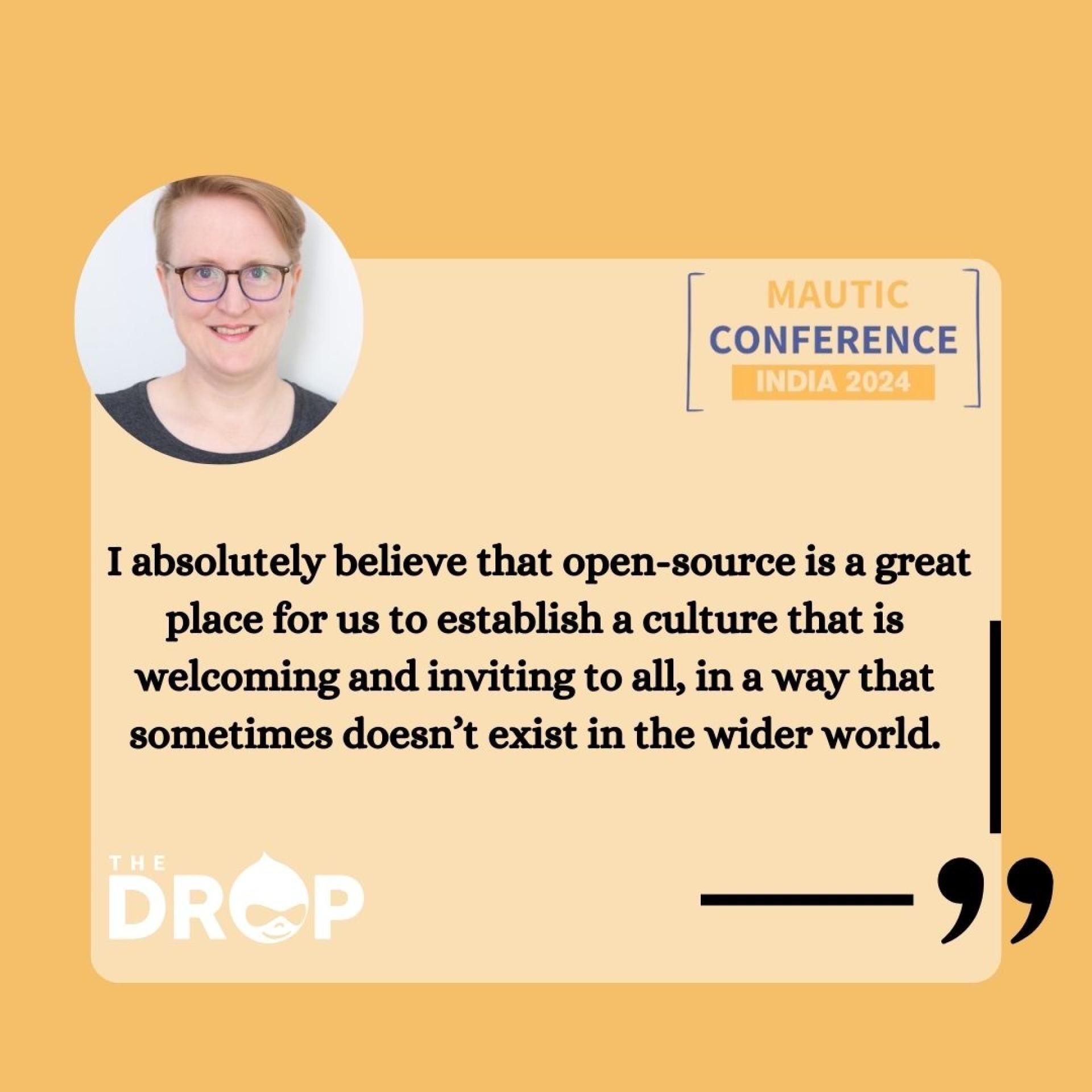
TDT [6]: After acquiring the autonomous status from Acquia, Mautic remained focused on community governance and streamlining the core. How far has that initiative come, and where do you think Mautic stands compared to the other Marketing Automation projects, Open-source or Proprietary?
Ruth Cheesley: That’s right. Once the announcement of Mautic becoming an independent open-source project was made, our first focus was to refactor our governance model, created in collaboration between Acquia and the Mautic community.
It was important that this happened collaboratively and was created by and for the Mautic community. We went through an extensive process where we considered each aspect of the governance model and what we needed to bring in or take out, and then finally, we had an open community consultation on each section where anyone could provide feedback, and ask questions and we updated the proposed model accordingly. We’ve developed a great governance model and recently held our first formal election process to appoint our Council. Our new Community Portal is starting to be used more, including moving all our meetup groups and meetings for teams so that people have a central place to find out what’s happening across the project.
As far as streamlining the core, this predates Acquia’s involvement. The founder of Mautic talked about this back in 2018, and it’s been something we’ve been working on moving forward with since then.
In the latest major release, Mautic 5, we’ve removed several bundles from the core of Mautic and moved them to third-party bundles, and a few that were no longer functional or used have been removed altogether. We are moving towards a fully composer-based installation process incorporating the marketplace during the installation process to select what composable aspects you require, but we still have a way to go on improving the user experience and documentation for this before we make it the officially supported way to install Mautic.
As a marketing automation platform, I feel that Mautic stands out amongst other providers in terms of the power and flexibility it allows users to customise it to their specific needs. We were the first to emerge within the open-source ecosystem, and while other tools that offer marketing automation as part of a suite of tools are being launched, Mautic remains the most popular. We can’t afford to rest on our laurels, though, and we are starting to be able to look forward to the future and plan for innovative new features; now, we’ve made good progress in catching up with the technical debt that is often common in fast-growing startups.
TDT [7]: With Drupal increasingly establishing itself as a key component of a free and open-source digital experience platform ecosystem and marketing automation being a critical element of any DXP, there is significant potential for collaboration between the Drupal and Mautic communities. This partnership could position both platforms as strong competitors against proprietary DXPs and marketing automation tools. How do you view the opportunities for Mautic and Drupal to work together in this regard? Are there any specific plans or strategies to foster collaboration between the two communities?
Ruth Cheesley: I feel that there is huge potential for Mautic to collaborate with many open-source content management systems—including Drupal—to enable the growth of open-source digital experience stacks as strong competitors to the proprietary DXP stacks that are becoming increasingly commonplace.
Our focus has been establishing solid ground for Mautic’s future sustainability and launching our major release, Mautic 5. We haven’t had the resources to pursue specific strategies to develop our integrations and joint efforts to promote Mautic’s use with open source content management systems yet. However, it’s something that we’re planning to consider within the Council in the coming months. Watch this space!
TDT [8]: Besides your role in Mautic, you've also been involved in the Drupal community. Could you share some highlights of your contributions to Drupal and your experience as an Ambassador of the Community Health Team?
Ruth Cheesley: As an employee of Acquia, I was encouraged to give back to open-source projects, so I’ve been involved in the Diversity and Inclusion team, where I helped write a content article during a contribution sprint in Amsterdam at DrupalCon. I’ve spoken at several DrupalCon events supported by Acquia.
I’ve been an Open Source ambassador for the Community Health Team since 2020. This role is designed to be an external advisor—I can bring my experience from many other open-source projects to help Drupal’s Community Health team when they are considering issues that relate to Drupal where they might benefit from a wider perspective.
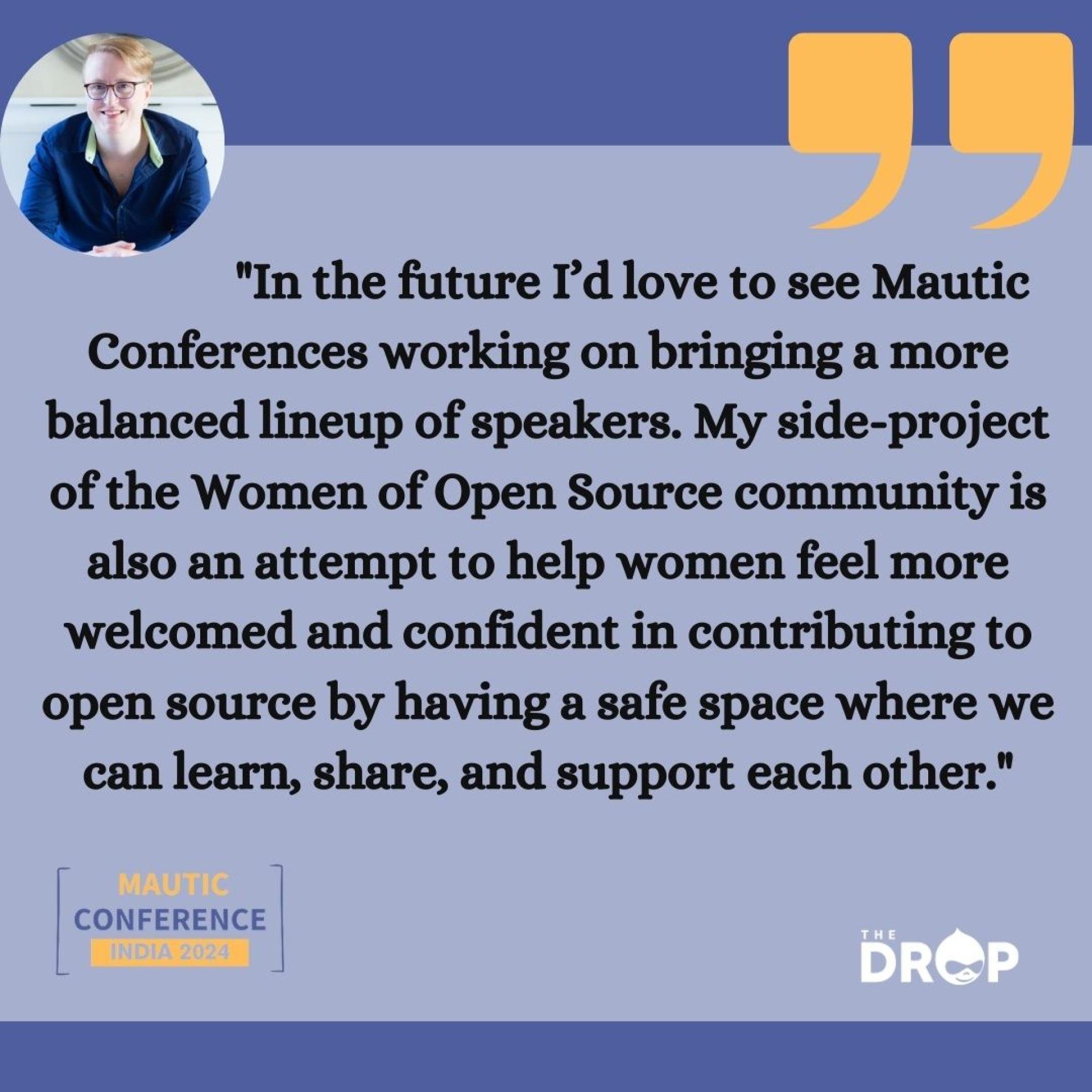
TDT [9]: The concept of composability—the ability to seamlessly integrate and interact with diverse systems and tools—is becoming increasingly important. This is especially true with the emergence of generative AI, which adds a new dimension of agility and capability to the MarTech ecosystem. Given this context, where does Mautic stand in terms of composability? How is Mautic adapting to ensure it remains a flexible and integral part of this dynamic environment? Can you share any insights or strategies regarding Mautic's approach to integration with emerging technologies and other MarTech tools?
Ruth Cheesley: We’ve been working on this since 2018, when the founder of Mautic first proposed that Mautic could become an API-first, headless application. We’re proud of the API's potential for marketers, but we plan to expand this further. Mautic already has some pretty powerful features when integrating with other tools—for example, webhooks and seamless integrations with Zapier and n8n, which are widely used.
We’re also taking steps towards making Mautic a lean application, which gives the marketer the power to determine what features and integrations they need for their marketing automation layer.
Firstly, we implemented full support for Composer in 2021, splitting all our bundles, plugins, and themes into separate repositories mirrored using Splitsh from the core Mautic repository. This laid the foundation for future work on composability, including enabling a lean installation with the option to install required functionality selectively during the installation process.
We are also growing a dynamic and innovative ecosystem around Mautic. We’re already seeing multiple exciting developments of plugins bringing the power of AI, for example, to the marketer’s workflow. Plugins using the integration framework already allow for seamless bi-directional sync, enabling developers to integrate with just about any other tool.
We recently launched our updated developer documentation, which greatly helps developers start building plugins and integrations to extend Mautic’s capabilities further.
TDT [10]: Mautic has a global and diverse community. How has community engagement shaped Mautic's development, and how can individuals get involved?
Ruth Cheesley: That’s right. We have a diverse community of people from all over the world who get involved in supporting Mautic and helping others succeed with Mautic. Community engagement has been vital to driving forward Mautic’s growth. While Acquia has historically been the biggest contributor to Mautic, we’re also seeing quite a few other organizations doubling down on their involvement and supporting us in moving Mautic forward faster. Check out our publicly shared report, which shows contribution activity over time.
We have a Community Handbook with many ways documented for people to get involved with Mautic—https://mau.tc/contribute, but whatever you want to give to Mautic, we’ll find a way for you to get involved! The best thing to do is get into Slack—https://mau.tc/slack-invite—and join the #community. Let us know your skills and interests, and we’ll match you up with a mentor to get you started.
You can also join one of our community sprints in Belgium at the end of January (which was over when we got this interview finished) and another in Pune the day after the Mautic Conference in India. These are great ways of getting to know people in the community while spending some focused time working on your interests. Often, we have a remote option for contributing to a sprint as well, so you can dial in and see us in the room and get involved with the teams and what they’re working on.
The best thing to do is join the Community Portal—https://community.mautic.org—there, you’ll find all of the team Assemblies you can follow, meetings and events to join, and so forth.
TDT [11]: Mautic is the only free and open-source software in the marketing automation arena. Its accessibility to all makes it an integral part of a potential free and open source (FOSS) DXP ecosystem, alongside other tools like Drupal, WordPress, Unomi, Matomo, etc. Given the societal need for tools like Mautic to survive and thrive in a competitive landscape, how do you envision the future of Mautic? What strategies or initiatives are planned to expand its user base and community? How do you plan to enhance Mautic's visibility and appeal in the broader ecosystem of open-source tools, ensuring its growth and sustainability in the face of increasing competition?
Ruth Cheesley: Last year, we held a two-day sprint with the Marketing Team where we looked at just this. Broadly speaking, our strategic objectives fit into three areas: helping people find, use, and love Mautic. The team is working on several projects this year in each of these areas, but it’s one of our most under-supported teams, so we would welcome anyone interested in this area to step up and get involved. Non-code contributions are, after all, just as important as code ones to an open-source project!
From the strategic standpoint, our new trials project, which is coming on-stream at the start of March, seeks to lower the barrier of entry to people who want to know what Mautic’s about. A common blocker we hear from newcomers is that they struggle to jump over the first hurdle of installing and configuring Mautic to see what it does. This has the added benefit of generating a revenue stream for the community if people continue with the hosted platform—or they can take a full export of their trial instance and use that to either self-host or go with another provider.
This will also help us stand out more prominently because it allows a much wider audience to 'get their hands dirty' with Mautic and explore the incredible potential it can unlock in their organizations.
We’re also listening to the feedback from our users, with several projects coming on stream this year to improve the user experience and deliver new features that make the marketer’s experience even more delightful.
Finally, I also want us to improve our connectivity with other tools. Right now, while we do integrate with many, on the whole, those integrations don’t have a dedicated team of maintainers who are taking care of adding new features and keeping them up to date. We want this to change by empowering community members to pick up their reins, take ownership of these key integrations, and create more! Launching our new developer documentation goes a long way to helping people learn how to create and maintain plugins.
TDT [12]: Last but not least, what advice would you give someone looking to get involved in open-source projects, particularly within the marketing automation space?
Ruth Cheesley: I’d say just to get started—find things you enjoy doing and offer to help with those things in a project. Whether it’s bringing people together in-person or online for a meetup, fixing bugs, testing new features and bug fixes, helping with the marketing, making designs or content for social media—there’s something for everyone.
In Mautic, we have a contributors' guide that explains the most common ways people can contribute. Most projects will have something similar. Also, check their Code of Conduct and get a feel for the tone of the community by joining their communication channels and engaging a bit (e.g. Slack, forums, mailing list, etc.). This will give you a good sense of whether it’s a place you’d like to spend your free time.
The hardest thing to do is to raise your hand and say, 'I’d like to help.' So jump over that hurdle and see where it takes you from there!
Check out this great article from Angie Byron: Avoiding common pitfalls when first contributing to open source: Tips and tricks for getting started, which gives some great tips for getting started.
Disclaimer: The information provided about the interviewee has been gathered from publicly available resources. The responsibility for the responses shared in the interview solely rests with the featured individual.
Note: The vision of this web portal is to help promote news and stories around the Drupal community and promote and celebrate the people and organizations in the community. We strive to create and distribute our content based on these content policy. If you see any omission/variation on this please let us know in the comments below and we will try to address the issue as best we can.



